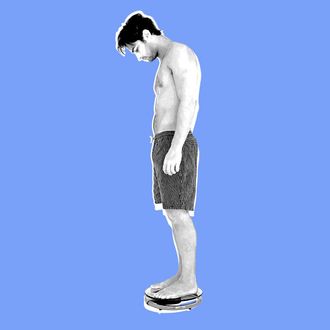
Even if you’re not actually overweight or obese, it’s hard not to imagine that life would be approximately one million percent better if only you could lose ten pounds or so. But a new paper in PLOS ONE found the opposite: People’s rates of depression actually may creep up after weight loss.
According to the press release:
In a study of 1,979 overweight and obese adults in the UK, people who lost 5% or more of their initial body weight over four years showed significant changes in markers of physical health, but were more likely to report depressed mood than those who stayed within 5% of their original weight.
But wait, there’s more:
Of the 1,979 overweight and obese participants, 278 (14%) lost at least 5% of their initial body weight with a mean weight loss of 6.8kg per person. Before adjusting for serious health issues and major life events such as bereavement, which can cause both weight loss and depressed mood, the people who lost weight were 78% more likely to report depressed mood. After controlling for these, the increased odds of depressed mood remained significant at 52%.
The researchers, led by Sarah Jackson of the University College London, say that unhappiness after weight loss could be explained by a few factors. For one, it’s incredibly hard to keep weight off, requiring sustained use of self-control, something some research has suggested is a finite resource. So frustration from lack of willpower could be behind the drop in mood, the study authors suggest. Or, because the study was correlational, another explanation could be that we’ve got it backwards: Perhaps the unhappiness triggered the weight loss, instead of the other way around.
But here’s another thought: A big change in your body doesn’t necessarily mean a big change in your life, and high expectations for a brand-new life to accompany your newly slim body can surely lead to disappointment. Jackson said as much in the press release for her findings. “[P]eople should not expect weight loss to instantly improve all aspects of life,” she said. “Aspirational advertising by diet brands may give people unrealistic expectations about weight loss. They often promise instant life improvements, which may not be borne out in reality for many people. People should be realistic about weight loss and be prepared for the challenges.” More evidence that happiness is found in low expectations.




